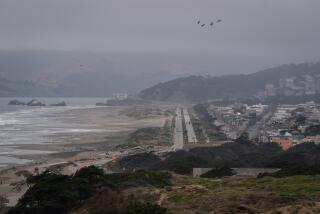Editorial: Coastal Commission should back down in effort to fire director
Expect a bizarre bit of circus when the California Coastal Commission convenes at Morro Bay on Wednesday. At that monthly meeting, the commissioners are scheduled to open an unusual public hearing on whether to fire Executive Director Charles Lester, who has been in charge of the agency since his long-serving predecessor, Peter Douglas, retired in 2011. Why some of the commission’s 12 voting members want to fire Lester hasn’t been aired publicly yet, although sources have cited dissatisfaction with his leadership, slow responses from the staff to commission requests and a lack of transparency, among other things.
The Coastal Commission remains a key tool for controlling coastal development and preserving the public’s access to the beach.
But a broad collection of political figures, 76 environmental groups, 35 former commission members and 153 current staffers have stepped forward to defend Lester. They say there’s nothing wrong with his job performance and make a persuasive case that the move to oust him is a power grab by pro-development forces that are threatening to undercut 40 years of Coastal Commission stewardship that, while imperfect, has left the coast much less developed and more accessible to the public than it otherwise would have been.
Dismissing Lester would be bad for California and inconsistent with the commission’s raison d’etre — protecting the coast.
The commission has endured such struggles before. Douglas, who personified the goals and ambitions of the Coastal Commission from its earliest years, fought off a similar dismissal attempt during sporadic struggles between the politically connected commissioners and the professional staff that evaluates projects under the commission’s jurisdiction.
So who’s pushing for Lester’s ouster? Close watchers point to Gov. Jerry Brown’s four appointees on the commission. The issue was raised in a closed meeting in December, and Lester was notified by letter last month that dismissal was being considered. The commission gave him the option of stepping down and having a role in the transition. But state law also gives him the right to a public hearing over his firing, and Lester wisely invoked that right, presumably hoping for just the kind of public backlash that is now mounting. Unless commissioners can present sound, defensible, professional reasons for dumping him, they should let him stay in his job and get on with the people’s business.
The commission came into being under a 1972 voter initiative and was made permanent with the California Coastal Act of 1976, which laid out the state’s goal to “protect, maintain, and where feasible, enhance and restore the overall quality of the coastal zone environment and its natural and artificial resources.” When Brown signed the act into law that year, he declared it “a major step forward in protecting the environment.” It became part of the legacy of his first governorship.
Although its history has been erratic, and its process has sometimes been more political than it should have been, the Coastal Commission remains a key tool for controlling coastal development and preserving the public’s access to the beach. It exists because the people of California said they wanted a mechanism to preclude powerful developers from having their way with what is a shared, public resource. Under the act, the state Assembly speaker and Senate Rules Committee each appoint four commissioners — two members of the public and two local elected officials — for a set term. The other four are appointed by, and serve at the will of, the governor.
So far, Brown has stayed out of what he characterizes as a commission personnel issue. But it’s clearly more than that, and Brown should lean on his appointees to drop the matter. Unless, of course, they are doing exactly what he wants them to, in which case the shame is his.
Despite his reputation for environmental action, Brown has a fractious history with the Coastal Commission — he described the staff as “bureaucratic thugs” when they insisted that houses being rebuilt after the devastating 1978 Malibu fire provide the legally required coastal access for the public. Still, signing the California Coastal Act was a laudable part of Brown’s considerable environmental legacy, and it would a shame if he were now to become known as the governor who let the pro-development foxes guard the coastal henhouse.
Follow the Opinion section on Twitter @latimesopinion and Facebook
More to Read
A cure for the common opinion
Get thought-provoking perspectives with our weekly newsletter.
You may occasionally receive promotional content from the Los Angeles Times.






